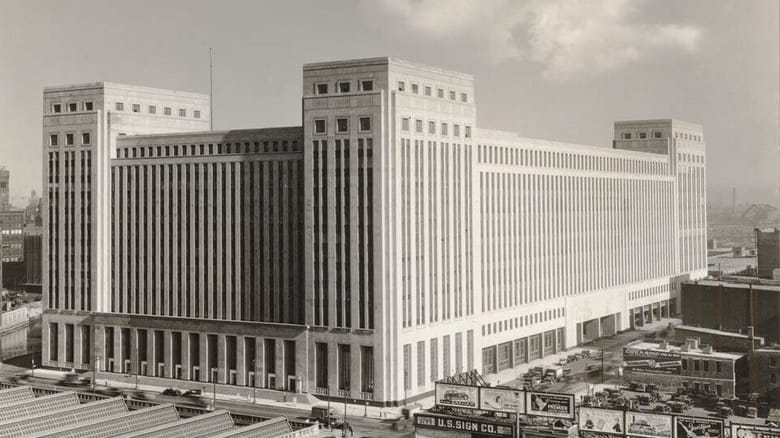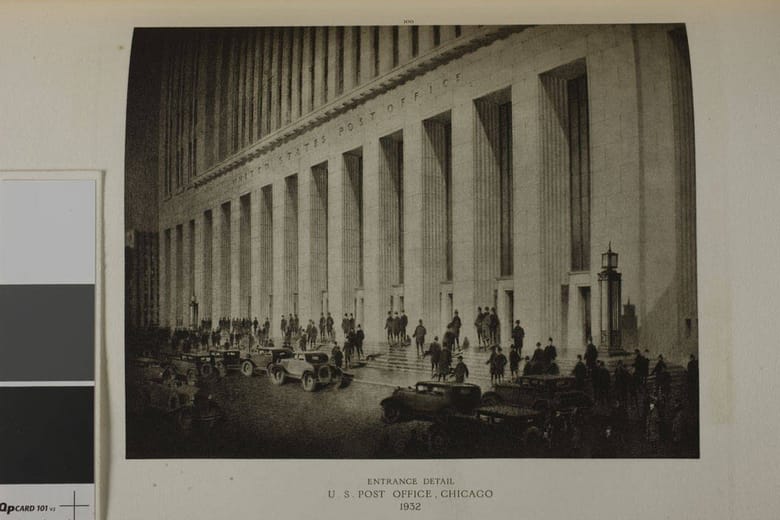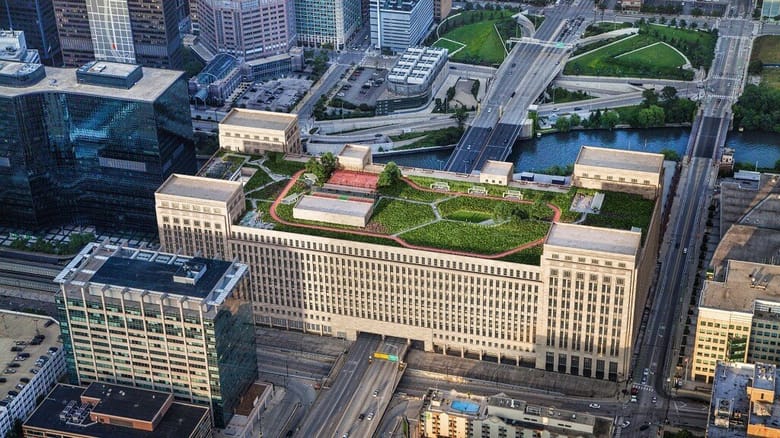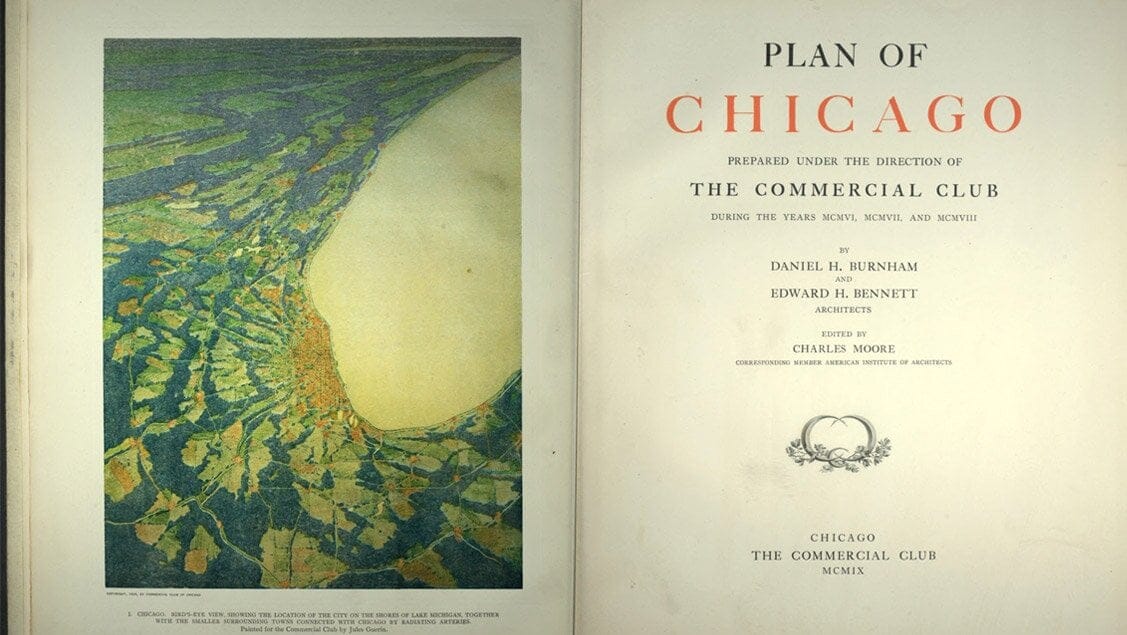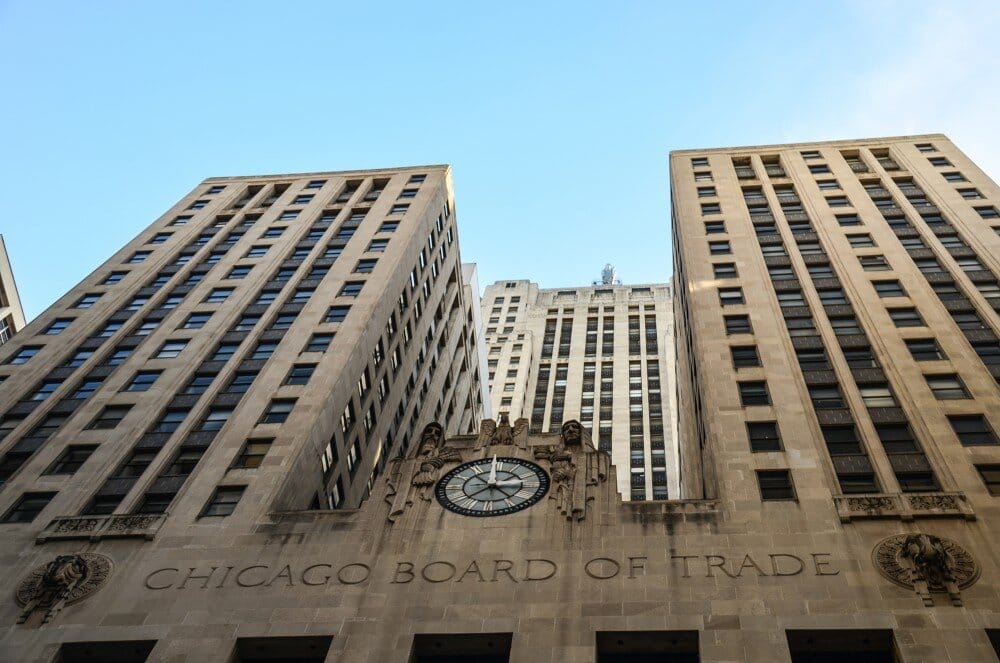What we know today as the Old Post Office was completed in two phases between 1921 and 1932 by Graham, Anderson, Probst and White, a successor firm to D.H. Burnham and Co. With its location above railroad tracks along the west bank of the Chicago River and its proximity to Union Station, the Old Post Office is one of the most significant buildings that was a direct result of the 1909 Plan of Chicago.
at a crossroads of style
At the time it was designed, Chicago was at a crossroads of popular architectural styles. The dominant Beaux-Arts style of the 1893 World’s Fair was still strong, however, Art Deco (then known simply as Moderne) was on the rise. The Old Post Office is a unique blend of both—a classically-influenced version of Art Deco.
Spanning over two city blocks, the Old Post Office stretches over railroad tracks and is known for having the Ida B. Wells Drive run through the building from east to west. Most of the building stands at around 190 feet high, translating into 12 floors in the building’s north section and nine floors for the rest of the building. The steel-frame structure features black granite at the base with gray limestone above. Vertical details, including large, tall windows with chevrons and vertical fluting, provide a visual counterpoint to the broad horizontality of the structure.
Inside, the main lobby soars 38 feet in height, featuring white marble-clad walls and stone floors in a checkerboard pattern. It has modernized classical forms and proportions combined with Deco-style details such as eagles and low-relief panels. Gold panels with stylized ornament honoring railroads and other motifs associated with the postal service are found throughout the hall.
35 million letters and 500,000 sacks of mail and packages daily.
In the 1930s, the Old Post Office was touted as the largest post office in the world, with more than two million square feet of floor space. It could handle 35 million letters and 500,000 sacks of mail and packages daily. Dozens of trains brought mail in and out of the building, while more than 5,000 trucks entered and exited the building every day. For a time in the 1940s and 1950s, mail helicopters used the roof as a landing pad. In addition to the postal facilities, the building also housed offices for administrative staff, an office for the Sixth Army Corps of Engineers, a cafeteria, sit-down restaurant, employee bank, first aid center, and a branch of the Chicago Public Library exclusively for post office staff.
In the 1960’s automated systems were introduced, and by 1996 a new central post office was completed and the Old Post Office building closed. It sat dormant for decades, with its future uncertain.
In 2011, British real estate developer Bill Davies completed the purchase of the dilapidated building and property for $38 million. His proposed redevelopment plan which included the building of 2000-foot tall twin towers that would be the tallest in North America—was never realized, and he sold the building to 601W, a New York City-based real estate company on May 13, 2016. Davies died the following day.
The Old Post Office Today
Extensive renovations followed—led by Gensler—and the building opened to office tenants in October 2019. The historic features were immaculately restored, and the interior transformed to accommodate modern office spaces. Today, the Old Post Office boasts more than 2.5 million square feet of multi-use office and event space including a 3.5-acre urban rooftop oasis—the largest of its kind in the city—complete with a running track, pickleball courts, basketball courts, and a stunning skyline view of the city.
Did you know?
In 1966, the post office came to a halt when a logjam of 10 million pieces of mail clogged the system for nearly a week.
Did you know?
The building was used in the filming of Batman Begins in 2004, The Dark Knight in 2007 and Transformers: Dark of the Moon in 2010.
Did you know?
Prior to the 1830s, before a formal post office was designated, mail was delivered to the home of trader John Kinzie for distribution.
Did you know?
In 1855, the federal government finally constructed a U.S. Post Office at the NW corner of Dearborn and Monroe, it burned down in the Great Chicago Fire of 1871.
Did you know?
With headquarters in Chicago, major mail-order companies such as Sears, Roebuck & Co. and Montgomery Ward greatly contributed to the city’s need for a large postal facility.
